
Newsletter Subscribe
Enter your email address below and subscribe to our newsletter

Enter your email address below and subscribe to our newsletter
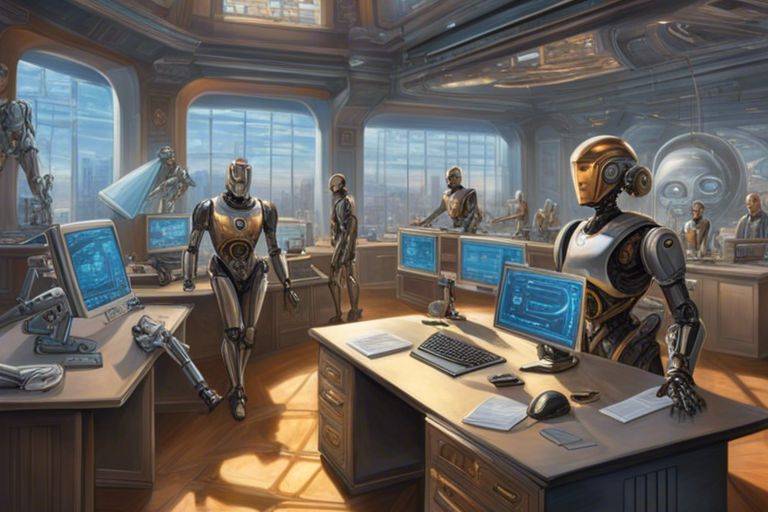
Over the past few decades, technology has drastically transformed the way we work, revolutionizing industries and creating new opportunities. As we look towards the future, it is crucial to understand how emerging technologies will continue to shape the workforce landscape. To gain insights into what lies ahead, we reached out to a panel of experts in various fields to share their thoughts on the future of work and technology.
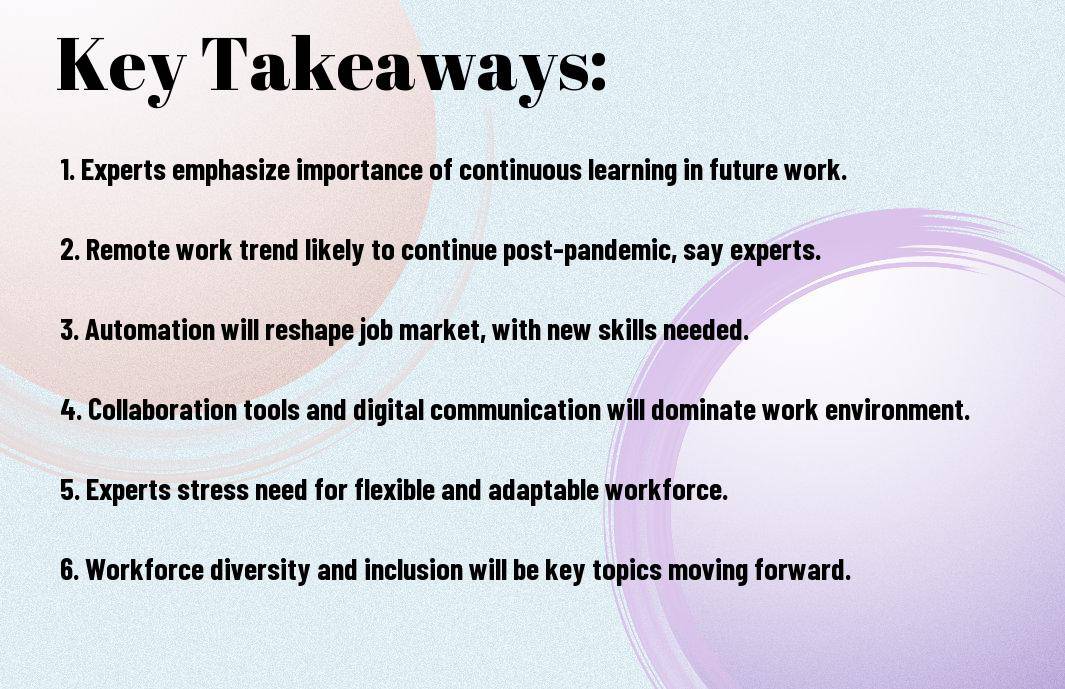
Even as the workplace continues to evolve, technology plays a crucial role in shaping its trajectory. From the historical transformation to key technological milestones affecting employment, understanding this evolution is vital for preparing for the future of work.
Workplace technology has undergone significant changes from the past to the present era. In the early days, manual labor dominated the workforce, with tasks requiring physical strength and endurance. However, with the advent of industrialization and mechanization, the nature of work shifted towards more automated processes. This transformation led to the rise of factories and assembly lines, fundamentally changing how work was organized and executed.
Past technological milestones have had a profound impact on employment patterns. The invention of the internet revolutionized communication and connectivity, allowing for global collaboration and remote work opportunities. Additionally, the development of artificial intelligence and automation has transformed industries by streamlining processes and increasing efficiency. However, these advancements have also raised concerns about job displacement and the need for upskilling to adapt to the changing landscape.
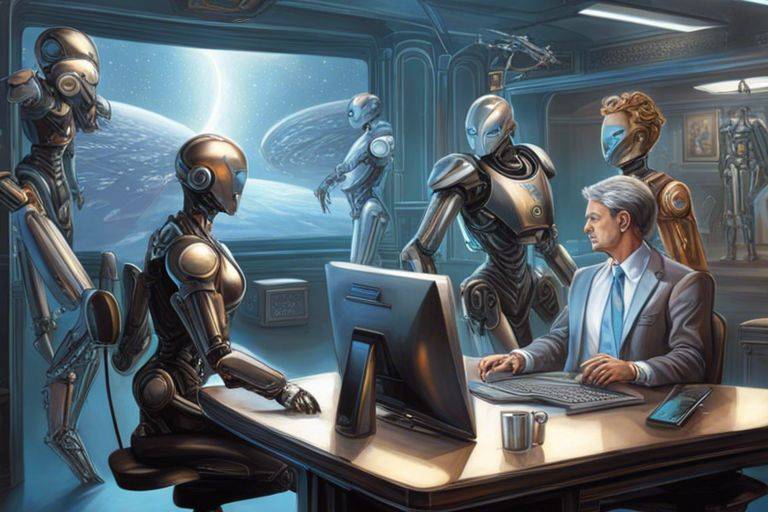
Keep in mind that as technology advances, so too does the impact on the future of work. Experts from various fields are constantly analyzing and predicting the effects of automation on jobs. To research deeper into this discussion, it’s vital to understand the insights shared on What is the future of work?
One critical aspect highlighted by experts is the varied impact automation will have on different industries. While some sectors may experience significant job displacement due to increased automation, others might see a transformation in the nature of work. It’s crucial for businesses to anticipate these changes and proactively prepare their workforce for the future.
To effectively navigate the challenges posed by automation, organizations need to implement robust strategies for workforce adaptation and reskilling. Automation can streamline processes and boost efficiency, but it also necessitates a shift in the skill sets required for the workforce. Embracing lifelong learning and upskilling initiatives will be imperative for employees to remain relevant in an increasingly automated world.
For many years, the concept of working remotely or being a digital nomad was considered a niche trend. However, with advancements in technology and a shift in workplace dynamics, remote work has become increasingly popular. More companies are embracing the idea of a distributed workforce, allowing employees to work from anywhere in the world.
Workforce flexibility is one of the key benefits of a distributed workforce. Employees can enjoy a better work-life balance, avoid long commutes, and tailor their work environment to suit their preferences. This can lead to increased productivity and job satisfaction. However, challenges such as ensuring effective communication, maintaining team cohesion, and addressing time zone differences can arise.
To support remote collaboration, companies are leveraging a variety of technological tools. Video conferencing platforms like Zoom and Microsoft Teams enable face-to-face interactions regardless of physical location. Project management tools such as Asana and Trello help teams stay organized and track progress. Communication platforms like Slack and Microsoft Teams facilitate instant messaging and file sharing, fostering seamless collaboration.
The integration of these technological tools not only streamlines workflows but also ensures that remote teams can communicate effectively and work together efficiently towards common goals.
Your economy is changing rapidly, with the rise of the gig economy redefining traditional employment structures. Freelance and contract work are becoming increasingly popular, offering individuals flexibility and autonomy in how they choose to work. This trend is driven by technological advancements that have made it easier for people to connect with clients and companies worldwide, breaking down geographical barriers.
As more professionals opt for freelance work, industries are witnessing a shift towards a more project-based approach to hiring. This trend allows companies to access specialized skills on-demand, while individuals have the freedom to pursue diverse projects that align with their interests and expertise. However, this shift also brings challenges such as fluctuating income streams and the need for continuous self-promotion and networking to secure new opportunities.
With the gig economy on the rise, employment landscapes are evolving, impacting job security and career development. While freelancers enjoy the flexibility of choosing their projects, they also face uncertainty in terms of stable income and benefits. The lack of traditional job security mechanisms like healthcare benefits and retirement plans can leave workers vulnerable to financial instability.
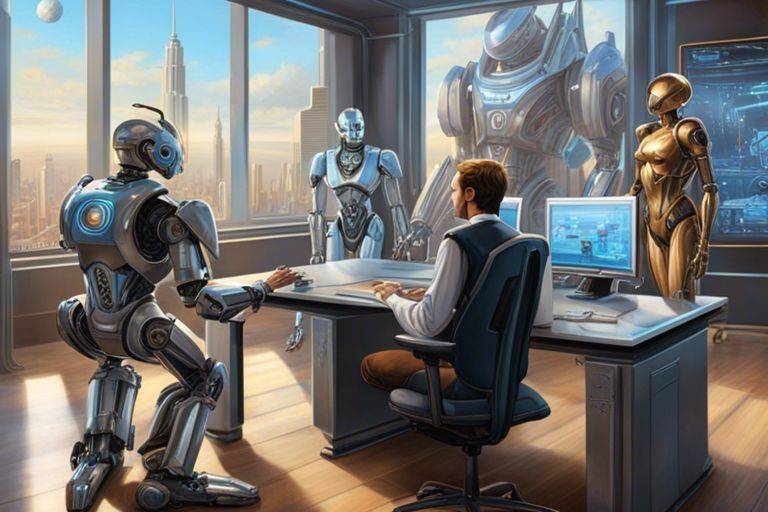
Not all technology comes without implications and concerns. According to a report by McKinsey, the ongoing advancements in technology, especially AI and machine learning, are rapidly transforming the future of work. These technologies are reshaping industries, job roles, and the skill sets required in the workplace.
Artificial intelligence is revolutionizing the way we work, impacting various career paths and industries. Jobs that involve routine tasks are increasingly being automated, leading to the creation of new roles that require advanced technical skills. For individuals to thrive in this evolving landscape, they must adapt by honing their critical thinking, problem-solving, and creativity skills. Embracing continuous learning and upskilling is necessary to stay relevant in the age of AI.
Artificial intelligence raises critical ethical considerations and the need for governance in its deployment. As AI systems become more sophisticated and autonomous, concerns around biases, data privacy, accountability, and transparency arise. Organizations must establish robust governance frameworks and ethical guidelines to ensure AI is used responsibly and ethically. Lack of proper oversight and regulation can lead to biases in decision-making, privacy breaches, and unfair treatment of individuals.
Another important aspect of AI deployment is the need for continuous monitoring and evaluation of AI systems to detect and mitigate any potential ethical issues. Organizations must prioritize ethical considerations alongside technological advancements to foster trust among employees, customers, and society at large. Transparency, accountability, and inclusivity should be at the core of every AI implementation to mitigate risks and ensure positive outcomes.
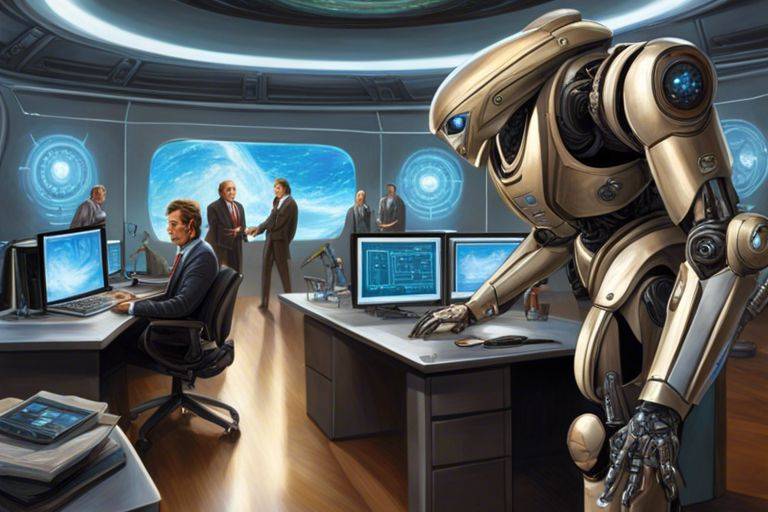
Unlike in the past, the rapid advancement of technology is reshaping the skills required in the workforce. Any education system must adapt to these changes by focusing on developing critical thinking, creativity, adaptability, and collaboration skills. Traditional educational models need to be reimagined to incorporate more project-based learning, real-world applications, and interdisciplinary studies to prepare students for the complexities of the future work environment.
Platforms for lifelong learning are becoming increasingly important as professionals need to continuously update their skills to stay relevant in the rapidly evolving job market. These platforms offer a wide range of courses, certification programs, and micro-credentials that allow individuals to upskill or reskill at their own pace. Meet the demand for flexible and accessible learning opportunities, these platforms provide a valuable resource for professionals looking to enhance their skills and knowledge.
Once again, the topic of work and technology intersects to shape the future landscape of employment. As outlined in a report by the National Intelligence Council, Technology and the Future of Work are closely intertwined, presenting both opportunities and challenges for individuals and organizations.
Technological advancements have revolutionized the way we work, offering increased efficiency and productivity. However, the rise of automation also raises concerns about job displacement and the impact on human well-being. It is crucial to find a balance between leveraging technology for enhanced performance and ensuring that human needs, such as job security and well-being, are prioritized. Strategies such as upskilling and reskilling programs can help employees adapt to the changing work environment and mitigate the negative effects of automation.
World today grapples with the challenge of maintaining a sense of purpose and fulfillment in an increasingly automated world. As routine tasks become automated, there is a growing emphasis on the importance of meaningful work that promotes personal growth and satisfaction. Organizations need to prioritize creating opportunities for employees to engage in work that aligns with their values and interests, fostering a sense of fulfilment and motivation in a technology-driven workplace.
As we navigate the evolving landscape of work and technology, it is important to consider the human aspects of employment alongside technological advancements. By striking a balance between automation and human well-being, and by prioritizing meaningful work experiences, we can pave the way for a future where technology complements rather than replaces human potential.
So, after gathering insights from various experts, it is evident that the future of work and technology is set to be transformative. The integration of advanced technologies such as artificial intelligence, automation, and data analytics is expected to revolutionize industries across the board, creating both opportunities and challenges for workers and businesses alike.
It is crucial for organizations and individuals to embrace these changes proactively, upskill themselves, and adapt to the evolving landscape to stay competitive in the digital age. By staying informed, being adaptable, and leveraging the potential of emerging technologies, we can shape a future where work and technology complement each other to drive innovation, efficiency, and growth.
A: Asking experts provides valuable insights and forecast trends that can help individuals and businesses prepare for the changing landscape of work and technology.
A: Experts can analyze current trends, technological advancements, and market forces to predict how these factors will shape the future of work.
A: Experts often explore topics such as automation, artificial intelligence, remote work, skills training, and the gig economy when discussing the future of work and technology.
A: Insights from experts can help individuals and businesses make informed decisions, adapt to changes, and stay competitive in a rapidly evolving work environment.
A: Expert opinions on the future of work and technology can be found in research reports, industry conferences, online webinars, and publications by reputable organizations and thought leaders.
A: Individuals can stay informed by following thought leaders on social media, attending industry events, reading relevant publications, and participating in online forums and discussions.
A: Businesses can future-proof their workforce by investing in upskilling and reskilling programs, fostering a culture of innovation and adaptability, and embracing technological tools and solutions that enhance productivity and efficiency.